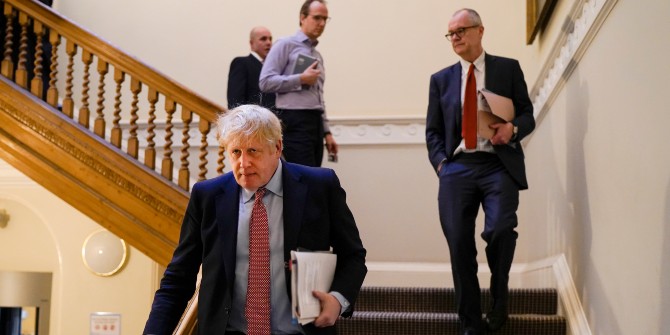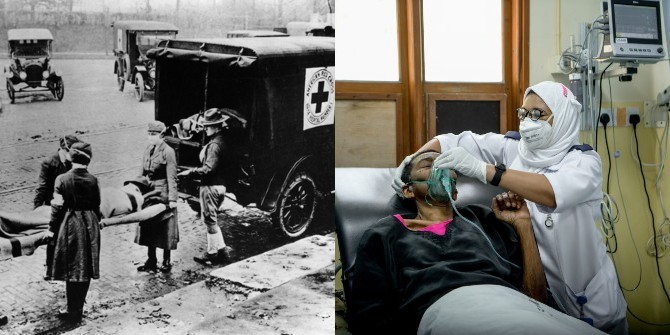Public health outcomes should not be the only measure of success (or failure) of a state’s response to a pandemic. The health of the institutions that guard democracy, human rights and the rule of law matter, too, say Joelle Grogan and Alice Donald (Middlesex University).
The extent to which assumptions about how states would perform in the face of COVID-19 – based on regime type, pre-existing legal frameworks, or assessments of preparedness – proved to be unreliable. This is not to say that the pandemic transformed legal systems, institutions or governments or set in motion a pattern of democratic deconsolidation that was not already visible. Rather, it generally had the effect of accelerating pre-existing trends and exposing the true character of regimes (witness, for instance, how China’s response reflected deeply-entrenched features of its law and governance).
Pre-commitment to accountability, transparency and good governance tended to be reflected in a pandemic response that maintained these values (Finland, New Zealand, Taiwan), while autocratising or militarised states frequently seized upon the virus as a pretext to entrench power at the centre and treated it as a security problem as much as a health crisis (India, Hungary, the Philippines, Thailand, Turkey). Likewise, states habituated to forms of emergency rule continued that unfortunate trajectory (Egypt, France, Hungary, Malaysia).
Nevertheless, regime type was not a sure predictor of either the form of state response or its outcome in terms of suppressing infections or deaths: states on the spectrum from democracy to autocracy proved equally, and unpredictably, vulnerable in terms of both health and institutional outcomes. The breadth of pandemic responses across political systems (and the kaleidoscope of experience within each regime type) exposes this variation. Some autocrats used COVID-19 as a pretext for disproportionate restrictions and power grabs which did not, however, prevent catastrophic mortality rates (Viktor Orbán in Hungary); others cost lives through their inaction, denial and fantastical thinking (Jair Bolsonaro in Brazil). Some established democracies modelled a response that protected both public health and the ‘health’ of legal and political institutions (Finland, New Zealand, Taiwan); others fell disastrously short on both these counts (UK, United States under Trump). In states on the spectrum between authoritarianism and democracy, the pandemic appeared to pull systems in different and sometimes unexpected directions: towards democratic consolidation (Singapore) or along the opposite path (Malaysia).

Nor were pre-existing legal frameworks necessarily a reliable guide for what actions countries would take once the pandemic hit. Some states utilised existing statutory or constitutional emergency frameworks (Colombia, Thailand) but others did not invoke such frameworks (India, Turkey), or rapidly amended them (Germany). Other states swiftly enacted laws specifically designed to respond to COVID-19 (France, UK) or created centralised bodies to do so, sometimes without properly delegated authority (Iran, Pakistan). By contrast, one state eschewed legal measures to instead rely on non-binding recommendations and decentralised administration (Sweden).
Likewise there was variation in respect of whether states that declared formal emergencies reported derogations or limitations to the relevant international institutions (Colombia) or failed to do so (Hungary). The decision of whether or not to invoke emergency provisions, even where it could be justified as the more appropriate legal basis for the measures subsequently adopted by governments, often appeared to be primarily determined by political choice informed by wider socio-historical context – for example, negative historical associations with the abuse of power during a previous emergency (India, South Africa).
The consequences of such choices in terms of protecting democratic accountability and the rule of law also present a mixed picture: the declaration of a state of emergency or the use of emergency powers was not necessarily an indicator of abusive practices where it was accompanied by robust democratic accountability (New Zealand, Taiwan), and nor was rejection of emergency measures in favour of ordinary legislation or other non-emergency measures definitive proof of good governance where it opened the door to unchecked executive discretion (India, Turkey).
Arbitrariness, corruption, abuses of power, sluggish bureaucracies, misguided thinking and sheer complacency flourish where parliaments are suspended, side-lined or abdicate their duties of oversight
A further lesson is the need to understand the divergence between laws on paper, and laws as they were applied in practice during the crisis. This volume is replete with instances that demonstrate the need to design laws to confront infectious disease with appropriate safeguards to ensure conformity with the principles of legality, legal certainty, accountability, prevention of the misuse of power, access to justice, and equality before the law. Yet attention must also be paid to the environment in which law is applied and the health of the institutions that oversee its enforcement. Arbitrariness, corruption, abuses of power, sluggish bureaucracies, misguided thinking and sheer complacency flourish where parliaments are suspended, side-lined or abdicate their duties of oversight (Australia, Egypt, France, Hungary, India, Iran, Kenya, Malaysia, Pakistan, the Philippines, Thailand, Turkey); judiciaries are supine (Hungary, India, Iran, Malaysia, the Philippines, Thailand, Turkey); watchdog bodies are hobbled (Colombia); or civil society mobilisation is suppressed (Colombia, the Philippines, Turkey).
Such negative externalities not only correlate with a poor response to pandemic emergency, but also entrench perception of the weak capacity of these institutions beyond pandemic conditions. The positive inverse of this analysis is states whose democratic institutions rose to the challenge of the pandemic and ensured real-time oversight of restrictive measures, ensuring that they could be interrogated, fine-tuned and as a consequence enjoy greater public confidence (New Zealand, Taiwan).
States do not generally present a picture of either unalloyed success or rampant failure, especially when we look beyond the centralised institutions of the state towards regional and local governance and civil society. First, in some countries where federal executives and bureaucracies were weak or ineffective in their response to the pandemic, regional or local governments, civil society organisations and grassroots communities were catalysed into implementing measures of containment and creating networks of support (Brazil, Kenya, the Philippines, South Africa). Civil society mobilisation, and the receptiveness of state institutions to such pressure, can not only improve the quality of governance and decision making, but also increase public compliance; take, for example, instances where ‘track and trace’ apps were modified in response to loudly-expressed privacy concerns by the public and civil society, thereby encouraging wider take-up (Singapore, Taiwan).
Secondly, progress in terms of pandemic response was not linear, and not only because of regime changes (such as the dramatic shift from Trump to Biden): take, for example, Kenya, which introduced social protection measures early on, only to withdraw them without justification; or China, whose initial troubled response was supplanted by a more concerted (if draconian) mobilisation of resources. A temporal dimension must therefore be built into any analysis of a state’s response.
Thirdly, even in states that performed poorly overall from a public health or rule of law perspective, elements of good practice were visible, frequently connected to innovation through technology: digital democracy practices and use of technology to enable people to access justice, education and other public services must be sustained as an enduring and positive consequence of the necessity of isolation in regimes of all types.
Evidently, then, we should not view either individual states or regime types as monolithic when assessing their performance during the pandemic or their preparedness for future emergencies. To assume that autocratising states will contain the virus more effectively than democracies that respect constitutional restraints on executive power is to ignore the evidence that to control a population is not necessarily to control disease (as Hungary has learned), just as initial control of infection will not forgive consequent complacency (as the Philippines, Malaysia and India demonstrated to devastating consequence).
Certainly, approaching the pandemic as a ‘zero-sum’ game, in which saving lives trumped respect for other rights and freedoms, proved misguided. States that embraced this approach (exemplified by the Thai prime minister’s “health before rights” slogan) tended to sacrifice one to protect neither. Rather, the pandemic was a dramatic confirmation of what has long been an orthodoxy in human rights practice and scholarship – that the rights to life, health and other freedoms are indivisible and interdependent, and should be balanced, especially in the heat of pandemic decision making, using the well-tested framework of legality, necessity and proportionality provided by international human rights treaties and national laws and constitutions. Empirical measures of human rights compliance in this volume add ballast to this observation, showing that strong (or weak) observance of rights in any category tended to correlate with a high (or low) performance across all categories. In other words, upholding the rights to life and health, far from requiring states to ride roughshod over (say) freedom of expression or assembly, co-existed with protection of these rights and freedoms in terms of restrictions being properly justified and proportionate.
The corollary of this insight is that public health outcomes should not be the only measure of success (or failure) of a state’s response to pandemic disease; the health of the institutions that guard democracy, human rights and the rule of law matter, too, for they will be integral to success or failure in recovery from this pandemic and preparation for future emergencies. Indeed, such preparation requires nothing less than the conceptualisation of “public health and health care as part of the fabric of a democratic society”.
This post represents the views of the authors and not those of the COVID-19 blog, nor LSE. It is an edited extract from “Lessons for a ‘Post-Pandemic’ Future” Forthcoming in J Grogan and A Donald (eds.), Routledge Handbook of Law and the COVID-19 Pandemic (Routledge 2022).





